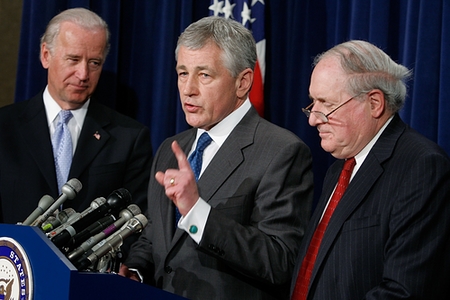
Barack Obama has an important op-ed today in the New York Times titled “My Plan for Iraq.”
It’s a useful portal into the current thinking in ObamaLand on America’s Iraq policy and continues to emphasize both his opposition in 2002 to the Iraq War and his intention to “end the conflict.”
Bringing conflict to a close does not necessarily mean withdrawing all troops, but my hope is that he does not get seduced into thinking that a largish residual, remaining force (say of 60,000 to 80,000 troops) would be seen by locals as anything other than a continued occupation.
What I like most about Obama’s framing of his position is that he conveys an appreciation of the interconnectedness of the Iraq War to other challenges. He correctly points out that America’s invasion of Iraq harmed our legitimate efforts against Al Qaeda and the Taliban in Afghanistan. And the fatigue of our military superstructure today is making a more focused effort on Taliban and Al Qaeda resurgence in Afghanistan ever more difficult.
It would be helpful if Obama — like his traveling partner Chuck Hagel does frequently — articulates an understanding that shows how the Israeli/Palestinian divide is also part of this regional mess that too many foreign policy pundits (and many in the McCain camp) wrongly silo into distinct and unrelated hot spots. But even without this, Obama’s framing shows positive progress in his strategic thinking.
Obama is also in touch with the costs of the war — 4,000 American deaths and nearly $1 trillion. I’d wish he would also mention the hundreds of thousands of Iraqis and Afghans who have died and the many other non-death casualties among American troops. But still, Obama doesn’t deny the costs and appropriately points out that this came from “invading a country that posed no imminent threat and had nothing to do with the 9/11 attacks.” As Council on Foreign Relations president Richard Haass has said many times, Iraq was for America a “war of choice.” Obama agrees and thinks we should never have gone in and, for the most part, believes we need to get out.
But I am buoyed by Obama’s embrace of the Maliki government’s call for a “timetable for withdrawal” that links to increasing Iraqi competence managing its own course. Such a withdrawal plan would be connected to the kind of Bonn Conference-like convenings of internal and regional political stakeholders that former Ambassador James Dobbins achieved with the Iranians and other stakeholders in stabilizing (in 2002) post-invasion Afghanistan.
This is exactly the kind of approach that Zbigniew Brzezinski has long called for — the announcement of a phased withdrawal connected to key negotiations among internal and external players. Chuck Hagel has long been calling for a similar kind of approach — though with greater specificity than Obama and with more discussion of the regional ecosystem.
Obama is showing some Hagel/Brezinskiesque realism, and that is an excellent thing.
I remain uneasy about Obama’s views on a “residual force”. The scale of troops that one of his advisors, Colin Kahl (a friend), recently alluded to was nearly equal to the number of troops America has left deployed in Japan and South Korea for five decades. That’s not “residual” or “minor”. That’s big — and if left deployed in Iraq would not change any of the fundamental substantive problems that exist today with large deployments.
Fortunately, Obama in his essay actually states that he doesn’t want anything like the character of deployments America has maintained in South Korea. This is excellent and commendable — a great step in conveying an understanding of the benchmarks and trade-offs involved with ending the Iraq War.
There is much more that Obama should share with us on his views on how to move America to a different equilibrium in the Middle East — but his oped today and his \ to Iraq with Senators Jack Reed (D-RI) and Chuck Hagel (R-NE) are confidence-builders.
— Steve Clemons


19 comments on “Obama’s Hagel-Brzezinski Plan for Iraq”